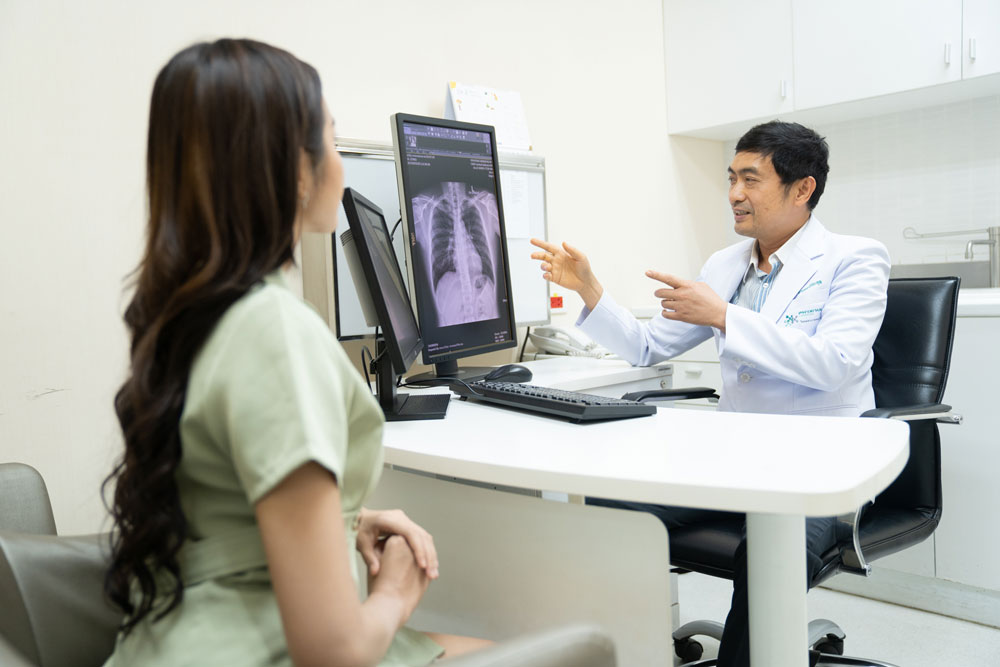
Dr. Manoch Panthongwiriyakul
"Being a surgeon has a unique aspect in treating patients, as they often come with severe and frightening symptoms. When we are able to help seriously ill patients survive and return to a normal life, or at least achieve a quality of life close to their previous state, we, as physicians, feel proud and happy, especially when we see patients and their families smile again."
After completing his Bachelor of Medicine at Siriraj Hospital, Mahidol University, Dr. Manoch Phantongwiriyakul pursued further studies and obtained a degree in surgical medicine from Phrapokklao Hospital in Chanthaburi Province. Currently, he works as a surgeon at Phyathai Sriracha Hospital. Dr. Manoch shared his inspiration and experiences during his studies:
“As a medical student, everyone has the opportunity to intern in various departments. I found myself drawn to surgical procedures, particularly when I got the chance to participate in actual surgeries. I realized that I was skilled at handling various surgical instruments and equipment, had the courage, and understood the intricacies of the work. I felt immense joy in curing patients of clear-cut diseases that suited my capabilities. With this realization, I had no hesitation in pursuing further studies in this field.”
As a surgeon, Dr. Manoch has extensive experience in caring for patients with a wide range of conditions and performing surgeries, including minimally invasive procedures. He said:
“Currently, the majority of patients under my care are accident victims, accounting for approximately 60% of cases. The remaining 40% consist of general medical treatments and surgical interventions, such as appendicitis, inflamed gallbladders, or cases where multiple diseases necessitate surgery. As a surgeon, I am responsible for providing treatment in such situations.”
One crucial aspect of a surgeon’s patient care is addressing the patients’ anxieties and desires for a successful surgical outcome without the need for repeated surgeries. Dr. Manoch emphasized the importance of this, stating:
“This is a vital aspect of a surgeon’s role. We need to carefully consider and plan surgeries to achieve successful outcomes in a single procedure. This is especially critical for patients with multiple concurrent conditions. The physician must prioritize and plan accordingly to maximize the benefits for the patient. The readiness of both the doctor and the patient is crucial in achieving this.”
Surgery for Severe Accidents: A Challenge in Treatment
Due to its proximity to major roads and industrial areas, Phayathai Sriracha Hospital often encounters numerous accident victims. In cases where multiple organs are injured simultaneously, it may necessitate multiple surgical interventions, as each procedure must prioritize the patient’s safety.
“Some patients have to stay in the hospital for several months due to severe accidents. However, we work as a professional team, equipped with expertise in almost every medical field. Collaborative care and treatment contribute to the patients’ improvement or recovery from their illnesses. Every doctor aims to help the patients regain a high-quality life, even if it requires a long treatment and recovery period.”
Advanced Tools and Innovations for Enhanced Treatment
In addition to basic diagnostic tools, the hospital is equipped with modern medical equipment and tools. Deep and accurate assessments of patients’ conditions can be performed, enabling clear identification of diseases and injuries. For instance, there are facilities such as Computed Tomography (CT Scan), Ultrasound, and Magnetic Resonance Imaging (MRI), among others, readily available. Moreover, the hospital possesses essential instruments in the operating room, as well as technologies used for endoscopic surgery.
“The significance of having excellent tools and equipment cannot be overstated. In the past, when doctors were new to the profession and examined patients based on conventional X-ray results, the decision on whether surgery was necessary or which specific area to operate on was not always clear due to insufficient data. However, nowadays, doctors can make precise diagnoses and determine whether surgery is required, and if so, the exact location to perform the operation. We can conduct examinations through endoscopic cameras and integrate the results with diagnoses from other departments to analyze and plan the treatment. This significantly reduces the risk of side effects, as everything is well-prepared and backed by accurate information. The results of surgeries have significantly improved as a result, thanks to these tools, which provide doctors with more convenience and accuracy in treating patients.”













